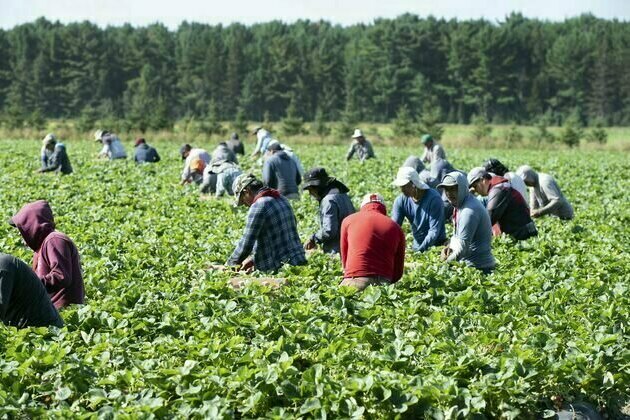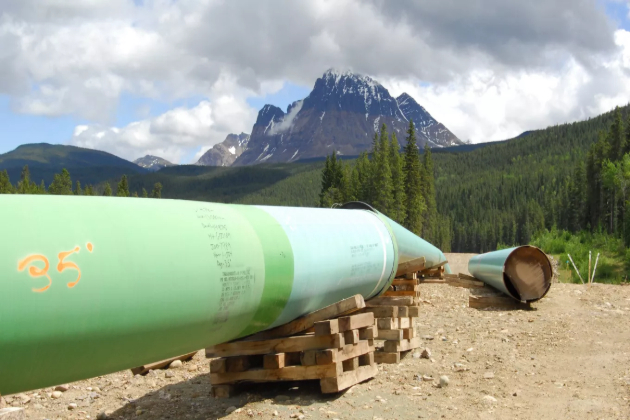Canada's new immigration policy favours construction workers but leaves the rest behind
The Conversation
22 Apr 2025, 11:53 GMT+10

Migrant workers have long been recognized as essential to Canada's economy. But that recognition rarely translates into meaningful inclusion. As Canada embarks on new immigration reforms, persistent inequalities continue to define who truly belongs, and who remains excluded.
In March, the federal government announced a new national pathway to permanent residence for up to 6,000 out-of-status construction workers.
Although framed as a recognition of essential labour, the new program highlights a deeper reality: Canada's immigration reforms continue to prioritize business and industry needs. In this instance, those needs are in housing and construction.
This selective approach reveals deeper patterns in Canada's immigration system, often described as a hierarchy of deservingness. This framework assigns greater value to certain types of labour, while sidelining others. This sidelining is often based on race, gender and class and limits access to recognition and rights for all essential workers.
Former Immigration Minister Marc Miller estimated that between 300,000 and 600,000 out-of-status people were living in Canada as of 2024. The new construction worker pathway, while important for some, will address only a tiny fraction of this population.
Read more: A national caregiving strategy is coming - what could it mean for Canadians?
With a federal election on the horizon, the construction worker pathway is as much a political move as a policy reform.
The program expands on a pilot that granted permanent residence to approximately 1,365 people and their families in the Greater Toronto Area before closing in December 2024.
The current national rollout of the program reflects public and industry pressure to address Canada's housing crisis. Housing has become a top priority for governments across the country.
Developers and industry groups, such as the Canadian Home Builders' Association, have long lobbied for faster housing construction and more skilled trades workers. Their advocacy, combined with widespread concern over affordability, made it politically attractive to prioritize construction labour rather than implement broader regularization efforts.
But this approach exposes who is left out. Sectors like caregiving, domestic work and agriculture, largely dominated by racialized and feminized labour continue to be excluded from clear and inclusive pathways to status.
Canada's low-wage economy has historically depended on the labour of racialized and immigrant women. Migrants in these sectors, often work in private or hidden spaces, making their labour less visible and politically legible.
Caregiving and domestic work in Canada have historically been undervalued. It is often framed as natural extensions of women's roles and systematically marginalized in immigration policy through programs like the Live-in Caregiver Program.
Research confirms that Canada's approach remains fragmented and insufficient. As part of my work with MIrreM, an international project studying irregular migration and regularization policies, we found that Canadian programs are often small, sector-specific and constrained by narrow eligibility criteria.
New federal government Home Care Worker Immigration pilots offer another highly competitive pathway to residency.
But these programs remain narrowly targeted, restricted and quickly capped, with application limits often reached on the same day they open. They also provide little relief for the many out-of-status caregivers already living and working in Canada.
Other countries have demonstrated that large-scale, inclusive reforms are possible, offering Canada a model to follow.
Spain's 2005 regularization program successfully granted legal status to 700,000 people. The Spanish assessment recognized employment records, community ties and long-term residence. This model shows that broad, fair regularization strategies can balance administrative efficiency with political feasibility.
Meanwhile, Canada's fragmented reforms exclude most out-of-status critical workers. And it leaves them without any sustainable pathway to status, prolonging their vulnerability and insecurity.
Read more: Personal support workers are the backbone of health care but the bottom of the power structure
Canada urgently needs a transparent, fair and scaleable immigration strategy. It must be one that values people's contributions, not just the immediate needs of businesses.
Cleaners, caregivers, farm labourers, food service workers and others deserve the same recognition and opportunity as those in construction.
A comprehensive regularization strategy would not only uphold dignity and fairness. It would also strengthen Canada's economy, improve labour protections and promote social inclusion.
As Canadians prepare to head to the polls, the incoming government faces a critical choice.
It can continue with piecemeal, politically convenient reforms that leave most out-of-status workers behind. Or it can commit to a broad, rights-based regularization strategy that recognizes the full social fabric of those who sustain this country.
 Share
Share
 Tweet
Tweet
 Share
Share
 Flip
Flip
 Email
Email
Watch latest videos
Subscribe and Follow
Get a daily dose of Toronto Telegraph news through our daily email, its complimentary and keeps you fully up to date with world and business news as well.
News RELEASES
Publish news of your business, community or sports group, personnel appointments, major event and more by submitting a news release to Toronto Telegraph.
More InformationBusiness
SectionApple's smartphone sales in China drop 9% in Q1 2025
BEIJING, China: Apple's grip on China's smartphone market continued to weaken in the first quarter of 2025, with the U.S. tech giant...
US may block DeepSeek over tech transfer concerns
WASHINGTON, D.C.: U.S. officials are considering new measures to block China's DeepSeek from acquiring American technology, according...
Toyota may build next-gen RAV4 SUVs in US
TOKYO, Japan: Toyota is weighing plans to build the next-generation RAV4 SUV in the United States, according to three people familiar...
Ford recalls over 148,000 vehicles in two safety campaigns
WASHINGTON, D.C.: Ford is recalling more than 148,000 vehicles across two safety campaigns, according to a notice issued by the National...
Archer Aviation teams up with United for NYC air-taxi service
NEW YORK CITY, New York: Archer Aviation has announced plans to start an air-taxi service in New York City, working with United Airlines....
Taiwan’s TSMC beats forecasts with strong q1 earnings
TAIPEI, Taiwan: Taiwan's TSMC reported stronger-than-expected first-quarter earnings on Thursday, driven by booming demand for AI-related...
Canada
SectionToyota may build next-gen RAV4 SUVs in US
TOKYO, Japan: Toyota is weighing plans to build the next-generation RAV4 SUV in the United States, according to three people familiar...
Honda may shift car production to US amid tariff pressure
TOKYO, Japan: Facing the pressure of new U.S. tariffs, Honda is weighing a shift in its production strategy that could see more of...
Feds order safety fixes after Keystone oil spill in North Dakota
BISMARCK, North Dakota: Federal officials have ordered the company running the Keystone Pipeline to take several safety steps after...
Ambitious changes to Canadian conservation law are needed to reverse the decline in biodiversity
Canada's biodiversity is in decline. Globally, climate change, urbanization, overexploitation of resources and habitat loss are combining...
Canada's new immigration policy favours construction workers but leaves the rest behind
Migrant workers have long been recognized as essential to Canada's economy. But that recognition rarely translates into meaningful...
MB Chicken India Opens Doors in Chandigarh with a Grand Debut, Canada's Premium Fried Chicken Brand Now Serving in India
HT Syndication Chandigarh [India], April 21: MB Chicken, Canada's premium fried chicken brand, has officially landed in India with...











